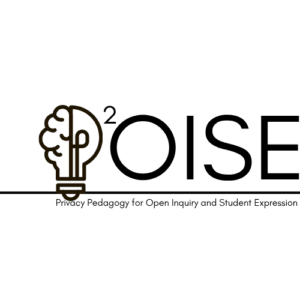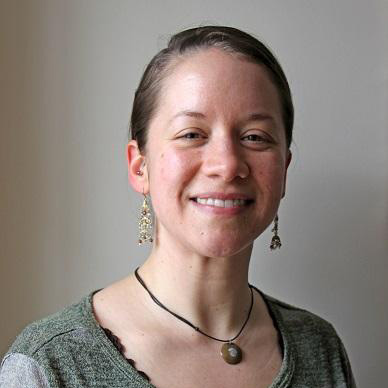Privacy Pedagogy for Open Inquiry and Student Expression (P2OISE) Project
Fostering student inquiry and expression with privacy-centered learning culture.What is P2OISE?
Privacy Pedagogy for Open Inquiry and Student Expression (P2OISE) is an instructor cohort for foregrounding learner privacy to enhance curiosity, inquiry, and discussion in the classroom. Instructors in this Provost Endorsement Program will gain resources, frameworks, and a supportive community to critically evaluate ed tech and reimagine course elements in order to deliver person-centered, privacy-aware learning experiences.

The Landscape
Broad adoption of ed tech increases access to education, engages students in active learning, and personalizes the learning experience.
Why it Matters
This digital transformation (Dx) changes the learning environment by introducing the potential for profiling, surveillance, and exposure. Students – and identity- and viewpoint-diverse students in particular – are concerned about their privacy and self-censoring in class.
A Solution
Privacy pedagogy is a practice of teaching about privacy while teaching with privacy principles. Privacy pedagogy informs person-centered learning design that prioritizes the ethical adoption of ed tech and establishes shared privacy values to foster authentic learning, inquiry, and discussion in the classroom.
Application for Fall 2025 are open!
Apply NowPOISE Project Commitment and Timeline
Selected instructors will engage in a year-long cohort to examine intellectual privacy and its relationship to learning, inquiry, and expression, and implement privacy pedagogy in their learning design. Instructors will redesign course materials based on privacy pedagogy principles to enhance the campus climate for open inquiry and free expression with a purposeful emphasis on the experience of identity- and viewpoint-diverse students. Program requirements include:
Fall
- Participate in an in-person, half-day on-boarding workshop to foster cohort community, learn the theoretical foundations of privacy pedagogy, and identify opportunities for privacy pedagogy learning design in your own course materials.
- Engage in a virtual, one-hour synchronous session to gain strategies for critically evaluating ed tech through a privacy lens.
- Participate in individualized pedagogical coaching sessions.
- Develop a student privacy syllabus statement and redesign selected course elements applying privacy pedagogy conventions.
Spring
- Implement redesigned course elements.
- Evaluate the impact of privacy pedagogy as an intervention to improve the classroom climate for student privacy, inquiry, and expression.
- Participate in an in-person, half-day wrap-up workshop, sharing your redesigned course elements and insights from your privacy pedagogy implementation.
- Submit your student privacy syllabus statement, redesigned course artifacts, cohort activities, and program evaluation to complete the program.
Instructors who successfully complete the P2OISE program will have the opportunity to share their work in Penn State forums and be eligible for Provost Endorsement.
At the end of this program, participants will be able to…
- Define privacy pedagogy and its application to teaching and learning design.
- Describe the limitations of FERPA in protecting student intellectual privacy.
- Explain the relationship between intellectual privacy, open inquiry, and free expression, with a purposeful emphasis on the concerns of identity-diverse and viewpoint-diverse students.
- Apply the TEACH Privacy framework to integrate privacy pedagogy in learning design.
- Compose a privacy syllabus statement and additional teaching and learning materials to address privacy topics as part of a course redesign project.
- Evaluate the effect of privacy pedagogy on the classroom climate for open inquiry and free expression with their students.
- Advocate for privacy pedagogy within their teaching context.
POISE Program Structure
POISE is a year-long cohort program for faculty interested in implementing privacy pedagogy to improve the campus climate for student inquiry and expression:
- August: Applications are open through August 31, 2025
- September: On-boarding workshop (in-person, half-day)
- October: Cohort meeting (virtual, one hour)
- November-December: Individualized consultations and learning design work
- Spring: Implementation
- May: Wrap-up workshop (in-person, half-day)
Participants who successfully complete and offer their revised courses will have the opportunity to share their work in Penn State forums and be eligible for Provost Endorsement.
How Can I Apply?
Interested in joining us? Apply now for the Privacy Pedagogy for Open Inquiry and Student Expression (POISE) program. POISE welcomes all Penn State faculty and instructors to apply; however, instructors teaching in Spring 2026 and who have the authority to modify course design will be preferred. Faculty will be notified if they are selected and with more details on how to proceed by early September.
Key Focus Areas
Practicing privacy pedagogy will improve the campus climate for learning, inquiry, and expression.
Faculty
Faculty will redesign courses with intellectual privacy in mind by implementing the TEACH Privacy Framework, a 5-part approach to privacy pedagogy. Learn more: Minding Privacy: Privacy Pedagogy Workshop
Students
Students need equity, respect, and belonging on campus as well as learning environments that foster their curiosity, inquiry, and expression. Privacy pedagogy enhances equity, respect, and belonging by foregrounding student privacy considerations in learning design, while also creating conditions conducive to learning and dialogue.
Campuses
Privacy pedagogy contributes to campus climates that uphold equity, respect, and belonging alongside open inquiry and free expression to support student learning.
Meet the Team
The project team includes Penn State faculty librarians Sarah Hartman-Caverly and Alexandria Chisholm, both reference and instruction librarians based at the Berks Thun Library at Penn State Berks, along with members from Teaching and Learning with Technology (TLT), also part of University Libraries. Hartman-Caverly and Chisholm are also co-editors of the 2023 book “Practicing Privacy Literacy in Academic Libraries: Theories, Methods and Cases” from ACRL Publishing, and recipients of an Institute for Museum and Library Services (IMLS) National Leadership Grant for the National Forum for Privacy Literacy Standards and Competencies held in March 2025 at Penn State.

Sarah Hartman-Caverly
Reference and Instruction Librarian
smh767@psu.edu
Associate Librarian
Penn State University Libraries

Alexandria Chisholm
Reference and Instruction Librarian
aec67@psu.edu
Librarian
Penn State University Libraries

Julie M. Meyer
Instructional Designer
jmm49@psu.edu
Teaching and Learning with Technology
Learning Design
